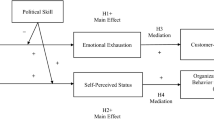Abstract
Extreme narcissistic organizations are unable to behave ethically because they lack a moral identity. While such organizations are not necessarily unethical intentionally, they become self-obsessed and use a sense of entitlement, self-aggrandizement, denial, and rationalizations to justify anything they do. Extreme narcissistic organizations might develop formal ethics programs, but such programs will have little effect on behavior.
Similar content being viewed by others
References
American Psychiatric Association: 2000, Diagnostic and Statistical Manual of Mental Disorders, 4th Edition. Text Revision (DSM-IV-TR). American Psychiatric Association: Washington, DC
Anand V., B. E. Ashforth, M. Joshi: 2005, Business as Usual: The Acceptance and Perpetuation of Corruption in Organizations. Academy of Management Executive, 1, 9–23
Bjorck, F.: 2004, ‹Institutional Theory: A New Perspective for Research into IS/IT Security in Organizations’, Proceedings, 37th Annual Hawaii International Conference on System Sciences
Brown, A. D.: 1997, Narcissism, Identity, and Legitimacy. Academy of Management Review, 22, 643–686
Duchon, D. and M. Burns: 2007, ‹Organizational Narcissism’, Proceedings, Southwest Academy of Management meeting, San Diego, CA
Ganesh, S.: (2003), Organizational Narcissism. Management Communication Quarterly, 16, 558–595
Gregory, B.: 1999, ‹The Impact of Narcissism on Leadership and Sustainability’, in A. Cohill and J. Kruth (eds.), Pathways to Sustainability: The Age of Transformation (published on-line at http://www.ceres.ca.gov/tcsf/pathways/index.html by the Tahoe Center for a Sustainable Future, 1999)
Hatch M. J., M. Schultz: 2000, Scaling the Tower of Babel: Relational Differences Between Identity, Image, and Culture in Organizations. In M. Schultz, M. J. Hatch, & M. L. Larson (Eds.), The Expressive Organization: Linking Identity, Reputation, and the Corporate Brand. New York: Oxford University Press
Ketola, T.: 2006, Corporate Psychological Defences: An Oil Spill Case. Journal of Business Ethics, 65, 149–161
MacIntyre, A.: 2007, After Virtue, 3rd Ed. Notre Dame, IN: University of Notre Dame Press
Moore G., R. Beadle: 2006, In Search of Organizational Virtue in Business: Agents, Goods, Practices, Institutions and Environments. Organization Studies, 27(3), 369–389
Nielsen, R. P.: 2006, Introduction to the Special Issue. In Search of Organizational Virtue: Moral Agency in Organizations. Organization Studies, 27(3), 317–321
Powell W., P. DiMaggio: 1991, The New Institutionalism in Organizational Analysis. Chicago: University of Chicago Press
Roberts, J.: 2001, Corporate Governance and the Ethics of Narcissus. Business Ethics Quarterly, 11, 109–127
Schein, E. H.: 1992, Organizational Culture and Leadership, 2nd Ed. San Francisco: Jossey-Bass
Scott, W.: 2004, Institutional Theory. In G. Ritzer (Eds.), Encyclopedia of Social Theory. Thousand Oaks, CA: Sage
Stein, M.: 2003, Unbounded Irrationality: Risk and Organizational Narcissism at Long Term Capital Management. Human Relations, 56, 523–538
Tajfel, H.: 1972, La Categorisation Sociale. In S. Moscovici (Ed.), Introduction a la Psychologie Sociale. Paris: Larousse
Tajfel H., J. C. Turner: 1986, The Social Identity Theory of Intergroup Behaviour. In S. Worchel, W. G. Austin (Eds.), Psychology of Intergroup Relations. Chicago: Nelson-Hall
Toffler B., J. Reingold: 2003, Final Accounting: Ambition, Greed, and the Fall of Arthur Anderson. New York: Broadway Books
Treviño L. K., M. E. Brown: 2004, Managing to be Ethical: Debunking Five Business Ethics Myths Academy of Management Executive, 18, 69–81
Trice H. M., J. M. Beyer: 1993, The Cultures of Work Organizations. Englewood Cliffs, NJ: Prentice-Hall
Turner, J. C.: 1985, Social Categorization and Self Concept: A Social Cognitive Theory of Group Behavior. Advances in Group Processes, 2, 77–122
Weaver, G. R.: 2006, Virtue in Organizations: Moral Identity as a Foundation for Moral Agency Organization Studies, 27(3), 341–368
Whetten, D. A.: 2006, Albert and Whetten Revisited: Strengthening the Concept of Organizational Identity. Journal of Management Inquiry, 15, 219–234
Author information
Authors and Affiliations
Corresponding author
Rights and permissions
About this article
Cite this article
Duchon, D., Drake, B. Organizational Narcissism and Virtuous Behavior. J Bus Ethics 85, 301–308 (2009). https://doi.org/10.1007/s10551-008-9771-7
Received:
Accepted:
Published:
Issue Date:
DOI: https://doi.org/10.1007/s10551-008-9771-7




